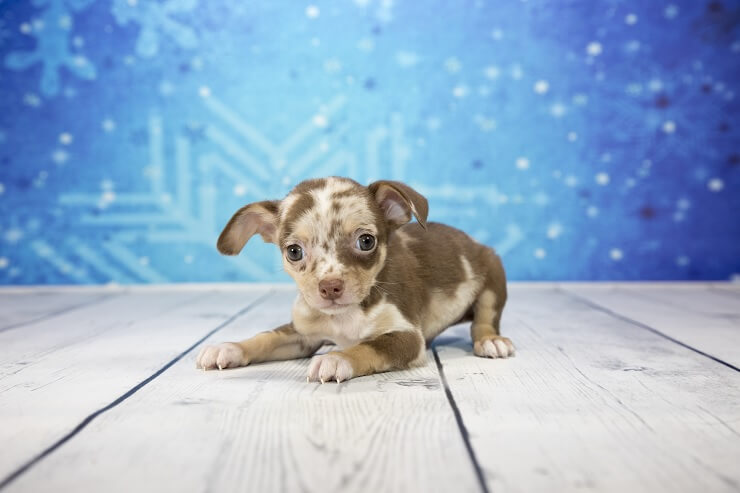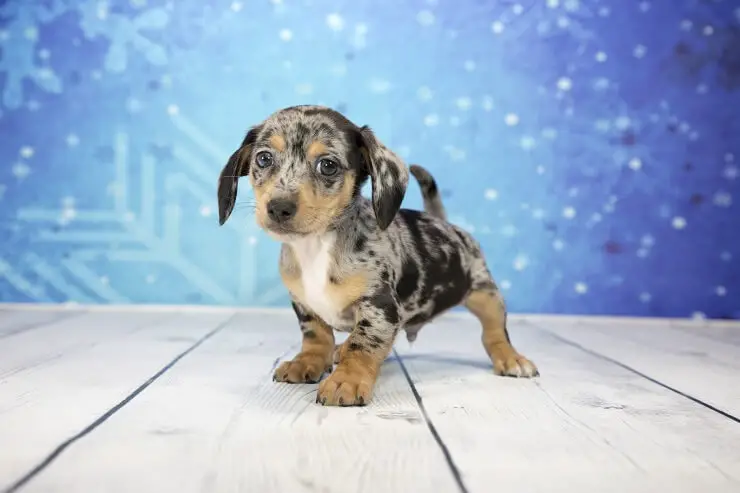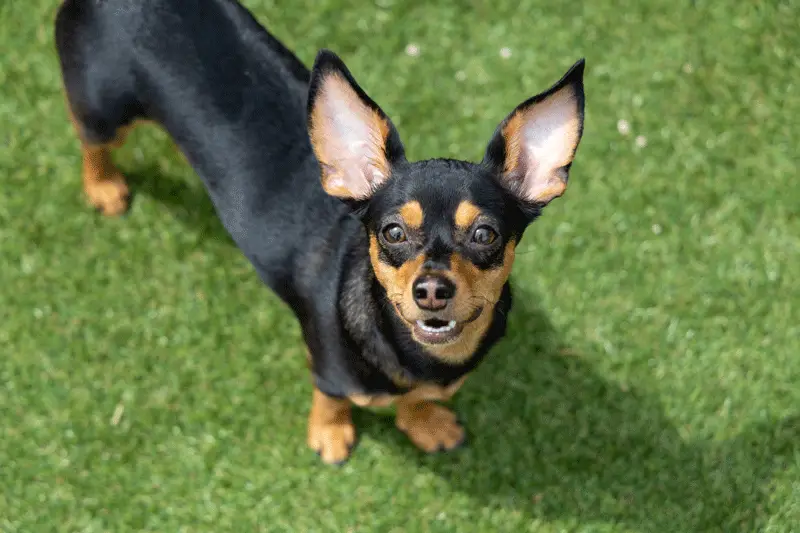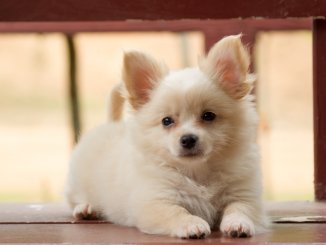Let’s get up close and personal with the Chiweenie, the small but mighty dogs that are making a big splash in the canine world. They go by other names, including Choxie, Doxihuahua, Chiwees, and Mexican Hotdogs.
Imagine a little dog with the spunk of a Chihuahua and the fun-loving attitude of a Dachshund. These little pets are becoming more and more popular, and it’s easy to see why. They might be small, but they have huge personalities, making them a great match for all kinds of homes and families.
I’ve met quite a few Chiweenies and I can tell you, they’re full of surprises. They’re playful, loyal, and have so much love to give. In this article, we’re going to dive into what makes Chiweenies so special. We’ll look at everything from their physical characteristics to their unique personalities.
Whether you’re thinking about getting a Chiweenie or just want to learn more about them, let’s jump in and get to know these adorable little dogs.
TABLE OF CONTENTS
- Chiweenie Quick Breed Summary
- Origin of the Chiweenie
- Chiweenie Appearance
- Personality and Temperament of Chiweenies
- Taking Care of Chiweenies
- Common Health Concerns in Chiweenies
- How to Train a Chiweenie
- The Cost of Owning and Raising a Chiweenie
- FAQs About Chiweenies
- So, Is the Chiweenie Right for You?
- More Chihuahua and Dachshund Mixes
Chiweenie Quick Breed Summary
| Other Names | Choxie, Doxihuahua, Chiwees, and Mexican Hotdogs |
| Origin | Germany |
| Parent Breeds | Chihuahua and Dachshund |
| Breed Group | Hybrid |
| Size | Small |
| Height | 6–10 inches |
| Weight | 5–12 pounds |
| Colors | Brown, chocolate, black, white |
| Coat | Smooth, long or short |
| Life Expectancy | 12–16 years |
| Temperament | Loyal, playful, protective, energetic, friendly |
| Shedding | Minimal |
| Barking Tendency | Frequent |
| Cost | $200–$750 |
Origin of the Chiweenie

From Adobe Stock
The Chiweenie, a delightful mix of sass and charm on four legs, has an interesting origin story. Emerging in Germany towards the late 20th century, this breed is a unique blend of two well-loved dogs: the spirited Chihuahua and the daring Dachshund.
While the exact reasoning behind this crossbreeding remains a bit of a mystery, the outcome is a popular and adorable ‘designer breed‘.
Although not officially recognized by the American Kennel Club (AKC), Chiweenies have carved out a special place in the hearts of dog lovers.
Chihuahua: The Tiny Titan with Ancient Roots
The Chihuahua’s journey is fascinating, hailing from the namesake region of Chihuahua, Mexico. This breed is a modern descendant of the ancient Techichi dog, cherished by the Toltecs since the 9th century.
Characterized by their diminutive stature, Chihuahuas rarely grow taller than 8 inches and weigh a maximum of 6 pounds. Despite their small size, they exhibit a regal elegance, with short, smooth coats that come in various colors like black, fawn, cream, red, and white.
These tiny titans are not just about looks; they boast a confident, loyal, and playful demeanor. Early training is crucial to shape their behavior into the ideal companion.
Dachshund: The Brave Hunter in a Small Package
Originating in 15th-century Germany, the Dachshund was bred with a specific purpose – hunting. These dogs come in two sizes: the standard Dachshund, reaching up to 9 inches in height and nearly 30 pounds in weight, and the miniature version, which grows to about 6 inches tall and weighs no more than 10 pounds.
Dachshunds have either short or medium-length coats, available in an array of colors including black, chocolate, cream, and white. These fearless and protective dogs are also known for their friendly and loving nature, especially towards their family. They are always ready for a game or a cuddle, making them excellent companions for all ages.
Chiweenie Appearance

From Adobe Stock
When you first lay eyes on a Chiweenie, you’re in for a delightful surprise. These little dogs are like a canvas of varying traits from their Chihuahua and Dachshund parents. No two Chiweenies look the same, making each one a unique masterpiece.
From their body structure to their ears, and even their coat colors, Chiweenies are a fascinating display of genetic diversity.
Small Stature, Big Personality: Height and Weight of Chiweenies
Chiweenies are small but mighty!
They typically stand at 6–10 inches tall and tip the scales between 5 and 12 pounds. What’s interesting is that males and females generally share the same size range. Since the Chiweenie is a relatively new mix and isn’t registered with the AKC, there are no set standards for their height and weight.
The size of a Chiweenie puppy can vary quite a bit, influenced by the traits they inherit from their parents. By the time they reach 18 to 24 months, these puppies grow into their adult size and appearance, which is always a little surprise package!
A Rainbow of Colors: The Chiweenie’s Coat
The coat of a Chiweenie is where things get exciting. They can be solid-colored or wear a mix of shades, depending on their parents’ colors. Common colors inherited include brown, black, and white, but you might also stumble upon the rarer grays and reds.
Most Chihuahuas sport short, smooth coats, while Dachshunds can have longer, straight, or wavy coats. The Chiweenie often blends these traits beautifully, resulting in a dog with a fascinating two or three-color pattern. Besides their striking looks, these dogs are low shedders and don’t need much in terms of grooming – a bonus for busy dog owners!
Body and Ears: The Chiweenie’s Signature Look
In terms of body shape, Chiweenies are quite the mixed bag. Some inherit the elongated body and short legs of the Dachshund parent, while others might get a shorter body with longer legs from the Chihuahua side. It’s like a fun genetic lottery!
The ears are another distinctive feature of the Chiweenie. Many inherit the sharply pointed ears of the Chihuahua, but don’t be surprised to see a Chiweenie with the long, floppy ears characteristic of a Dachshund.
As for their tails, these are usually long and narrow, a trait passed down from both parent breeds. The variety in their appearance makes each Chiweenie uniquely adorable, and it’s always a treat to see which traits will shine through in each pup.
Personality and Temperament of Chiweenies
Every time I come across these pint-sized pups, I’m struck by their vibrant personalities. They’re like the life of the party, packed into a small, adorable package.
Heartwarming Loyalty
One thing’s for sure, if you’re looking for a loyal friend, a Chiweenie is your go-to. These dogs have a way of forming incredibly deep bonds with their owners. They’re the kind of dogs that want to be involved in your daily life, whether you’re cooking dinner or relaxing on the couch. Their devotion is truly heartwarming.
Playful Yet Protective
Every Chiweenie seems to perfectly blend a fun-loving spirit with a protective streak. It’s fascinating to see them switch from playing with their favorite toy to suddenly taking on the role of a pint-sized guard dog. Their alertness is quite impressive, and it’s always done with a lovable, enthusiastic energy.
Seeking Attention with a Bark
These little dogs have a big voice and they’re not afraid to use it. Their barking isn’t just noise; it serves a purpose. They bark to communicate with their owners. They might bark to let you know they want some playtime or even just some cuddles. This characteristic can be a bit challenging, especially for those who prefer a quieter environment.
Adaptable and Energetic
Chiweenies have this remarkable ability to adapt to various living situations. Whether it’s a cozy apartment or a home with a yard, they fit right in. They love their playtime but don’t require extensive exercise, which is great for busy pet owners. Every time I meet a Chiweenie, I’m amazed at how they balance their energy with moments of relaxation.
Social Butterflies
Chiweenies are often little social stars. They thrive on interaction, both with humans and other dogs, provided they’ve had good socialization from a young age. It’s always a treat to see a Chiweenie making friends at the park, wagging their tail with joy.
Taking Care of Chiweenies

From Adobe Stock
The Chiweenie is a little dog with a personality as big as any giant breed. If you’re thinking about bringing a Choxie into your life, or maybe you’ve already fallen for one of these adorable pups, then you’re in for a treat. Taking care of these guys is an adventure in itself.
Food Needs
Feeding a Chiweenie – it’s a bit like being a gourmet chef for a very particular eater. These little dynamos need a diet that keeps up with their high energy, but you’ve got to watch the portions. It’s so easy for these pups to put on extra weight, and let’s be honest, a chubby Chiweenie is cute but not so healthy.
I’ve found that high-quality dog food meant for small breeds works wonders. It’s packed with all the good stuff they need. And keep those vet appointments regular; they can help you tweak the diet to make sure it’s just right for your specific furball.
Feed Chiweenies twice a day and limit the dog’s total food intake to 1/2 or 1 cup of food daily. Dog treats should be given rarely and treats should make up no more than 10% of the dog’s daily intake.
Grooming Basics
Grooming a Chiweenie does not have to be a full-time job, which is great news for us busy folks. Most of these pups have coats that are pretty easy to care for. A weekly brush-through keeps them looking sharp and gets rid of any loose hair. It’s also a great way to spend some quality time together.
For those with a bit more fluff, like the longer-haired Dachshund mix, you’ll need to put in a bit more effort to prevent matting. Regular baths with gentle dog shampoo and keeping an eye on those nails and ears are all part of the grooming routine.
Exercise Requirements
They might be small, but they’re not couch potatoes. They love to move! A daily walk is a must – it’s their chance to sniff around and explore. And playtime, oh, they love playtime. It could be fetch, a little tug-of-war, or just some goofing around together.
These dogs need between 30 and 60 minutes of intense physical activity every day.
But remember, they’re small, so they don’t need marathon sessions. Keeping them active and engaged is the key. It’s all about finding that sweet spot of fun and fitness.
Common Health Concerns in Chiweenies
Most Chiweenies are robust and lively dogs. However, they do inherit certain health predispositions from their parent breeds. Awareness and proactive management of these health concerns are crucial in ensuring a healthy, fulfilling life for your Chiweenie.
Dental Issues
Chiweenies often face dental challenges, largely due to their small jaw size, which is a trait inherited from both parent breeds. This can lead to overcrowding of teeth and associated problems.
- Regular Dental Check-ups: It’s important to have routine dental examinations by a veterinarian to monitor and manage dental health.
- Daily Teeth Brushing: Brushing their teeth daily with dog-specific toothpaste can significantly reduce the risk of dental diseases.
- Dental Chews and Toys: Incorporating dental chews and toys into their routine helps in cleaning teeth naturally and reducing tartar buildup.
Intervertebral Disc Disease (IVDD)
IVDD, a condition affecting the spinal discs, is a common concern for the Chihuahua Dachshund mix, particularly due to the long-backed nature of the Dachshund parentage. This can lead to back pain, mobility issues, or in severe cases, paralysis.
- Weight Management: Keeping your Chiweenie at an ideal weight is crucial to minimize the strain on their spine.
- Avoid Strenuous Activities: Activities that put stress on their back, like jumping on and off high surfaces, should be avoided.
- Supportive Bedding: Providing an orthopedic dog bed can offer better support for their back and joints.
Hypoglycemia
Hypoglycemia, or low blood sugar, is a risk for smaller breeds like the Chiweenie, especially during their puppy phase or if they are underweight.
- Regular Feeding Schedule: Consistent and frequent feeding times with a diet rich in nutrients can help maintain stable blood sugar levels.
- Healthy Snacks: Offering small, healthy snacks between meals can be beneficial, particularly for younger Chiweenies.
- Monitor for Symptoms: Watch for signs of hypoglycemia such as weakness, lethargy, or shaking, and consult a vet if these occur.
Obesity
Despite their energetic disposition, Chiweenies are susceptible to obesity. This can lead to a host of other health problems, including joint issues and diabetes.
- Balanced Diet: Providing a balanced diet that suits their age, size, and activity level is key.
- Controlled Portion Sizes: Be mindful of portion sizes and avoid the temptation to overfeed.
- Regular Exercise: Daily walks and play sessions help keep them fit and prevent weight gain.
Allergies
Chiweenies can suffer from various allergies, which may be related to food ingredients or environmental allergens.
- Allergy Testing: If your Chiweenie shows signs of allergies, such as excessive itching or gastrointestinal upset, allergy testing can identify the cause.
- Hypoallergenic Diet: In case of food allergies, switching to a hypoallergenic diet can alleviate symptoms.
- Regular Grooming: Frequent baths with hypoallergenic shampoo and regular grooming can help reduce skin irritation from environmental allergens.
How to Train a Chiweenie

From Adobe Stock
Training a Chiweenie, or as I like to call them, ‘little bundles of smarts,’ is an engaging and rewarding experience. These dogs may be small, but they have a lot of intelligence and eagerness to please, which makes training them both fun and interesting.
Understanding the Chiweenie Mindset
These dogs often inherit the intelligence and alertness of a Chihuahua and the playful yet stubborn streak of a Dachshund. This mix makes them quick learners but sometimes a bit headstrong. Patience and consistency are your best tools when training a Chiweenie. They respond well to positive reinforcement, so rewards and praises are your allies in this journey.
Starting with Basic Commands
Teach your Chiweenie simple commands like ‘sit,’ ‘stay,’ ‘come,’ and ‘leave it.’ These not only help in managing their behavior but also establish a communication line between you and your pup. Remember, short and consistent training sessions work best. They have short attention spans but are eager to please, so keep the sessions engaging and rewarding.
Socialization and Behavior Training
Introduce your Chiweenie to different people, pets, environments, and experiences from a young age. This helps them become well-adjusted adults. Chiweenies can sometimes be a bit protective and wary of strangers due to their Chihuahua heritage, so early socialization helps mitigate any potential anxiety or aggressive tendencies.
Addressing the Barking
Chiweenies can be vocal, and while this is part of their charm, it’s important to manage their barking. Training them to understand a ‘quiet’ command can be very useful. Also, understanding why they bark – whether it’s out of boredom, alertness, or seeking attention – can help you address the root cause. Providing enough mental stimulation and exercise can often reduce excessive barking.
Harnessing Their Intelligence with Advanced Training
Once you’ve mastered the basics, you can move on to more advanced training. Chiweenies are intelligent and capable of learning a variety of tricks and commands. This not only keeps their mind sharp but also strengthens your bond with them. Activities like agility training (suitable to their size) or advanced obedience exercises can be both fun and mentally stimulating for them.
The Cost of Owning and Raising a Chiweenie
Bringing a Chiweenie into your life, with their adorable quirks and endearing personality, is a decision that comes with both emotional and financial responsibilities. These delightful little dogs may be small, but the costs associated with their care can add up.
Initial Costs
- Purchase Price: Chiweenie puppies’ prices vary based on breeder’s reputation, location, and the puppy’s lineage. Typically, they range from $200 to $750.
- Initial Veterinary Care: Your first few vet visits, including essential vaccinations, deworming, and health screenings, might cost between $100 and $300.
- Spaying/Neutering: If your puppy isn’t already spayed or neutered, this procedure can cost about $200 to $500.
- Supplies: Getting started with a bed, crate, toys, feeding bowls, and grooming essentials can set you back around $150 to $300.
Ongoing Costs
- Food: A small breed like the Chihuahua Dachshund mix will require high-quality dog food, which may cost between $20 and $40 monthly.
- Routine Veterinary Care: Yearly vet check-ups and preventive care can average $100 to $300 annually.
- Grooming: Chiweenies are fairly low-maintenance, but occasional professional grooming might cost $30 to $60 per session.
- Pet Insurance: Optional yet advisable, pet insurance averages around $30 to $50 monthly.
Additional Costs
- Emergency Veterinary Care: Unforeseen health issues can be costly, often reaching hundreds or thousands of dollars.
- Training: Professional training, if desired, can range from $50 to $200, depending on the training’s nature and length.
- Miscellaneous: Consider costs for dog walking, daycare, or boarding, especially if you have a busy schedule or travel often. These costs vary widely.
FAQs About Chiweenies
Are Chiweenies easy to train?
Chiweenies are intelligent and can be easy to train, but they do have a streak of independence. Positive reinforcement techniques work best. Consistency and patience are important, as they can sometimes show a stubborn side inherited from their Dachshund lineage.
Are Chiweenies good for first-time dog owners?
Chiweenies can be a good choice for first-time dog owners, as they are adaptable and generally have a manageable size and temperament. However, potential owners should be prepared for their training and socialization needs, as well as their vocal nature.
How long do Chiweenies typically live?
Chiweenies often enjoy a long lifespan, typically ranging from 12 to 16 years. With proper care, regular veterinary check-ups, and a healthy lifestyle, some Chiweenies can even surpass this age range.
Are Chiweenies good family dogs?
Chiweenies can be excellent family dogs. They are usually affectionate and enjoy being part of family activities. However, due to their small size, families with young children need to teach them how to interact gently with these dogs.
Can Chiweenies live with other pets?
Yes, Chiweenies can coexist peacefully with other pets, especially if they are socialized from a young age. They generally get along well with other dogs and can also live harmoniously with cats.
So, Is the Chiweenie Right for You?
Envision a world where your every day is brightened by a pocket-sized ball of love, loyalty, and playful charm – that’s the delightful experience of sharing your life with a Chiweenie!
Yet, amidst their endearing qualities lies a challenge for the right owner – their need for specific training, exercise, and understanding of their spirited personalities. If you’re prepared to embrace the quirks and charisma of a Chiweenie, your life is about to get a whole lot brighter!
Chiweenie Is For
- Lovers of Small Dogs: If you adore small breeds, a Chiweenie is right up your alley. They’re perfect for cuddling and are manageable in size, making them great companions for smaller living spaces.
- Active Individuals and Families: Chiweenies have a good amount of energy. If you enjoy daily walks, play sessions, and interactive games, you’ll find a happy partner in a Chiweenie.
- Those Who Appreciate a Loyal Companion: Chiweenies form strong bonds with their owners. They’re known for their loyalty and affection, making them wonderful companions.
- First-Time Dog Owners: If you’re new to dog ownership, a Chiweenie can be a great start. They’re relatively easy to care for and respond well to positive reinforcement in training.
Chiweenie Isn’t For
- Those Seeking a Low-Energy Dog: If you prefer a more laid-back pet, a Chiweenie might be too energetic for you. They require daily exercise and mental stimulation.
- Families with Very Young Children: While Chiweenies can be great with kids, their small size makes them delicate. Families with very young children should consider this factor for the safety of the dog.
- Quiet-Environment Seekers: Chiweenies can be vocal. If you live in an environment where a barking dog might be an issue, or you prefer a quieter dog, this breed may not be the ideal choice.
More Chihuahua and Dachshund Mixes
Want a Chihuahua mix or a dachshund mix, but aren’t keen on the chiweenie? Check out these other hybrid dog breeds:
Chihuahua Mixes
- Chihuahua Terrier Mix
- Jack Russel Chihuahua Mix
- Shih Tzu Chihuahua Mix
- Pomchi
- Pomeranian Chihuahua Mix
- Chihuahua Poodle Mix
- Chihuahua Great Dane
- Chorkie
- Chug Dog







I adopted my cheewinie, Annie when she was 5 1/2 years old.
She just turned 8 in July.
She is a loving cute little dog that sleeps with me at night. In the winter she sleeps under covers. She will lye down next to me in my recliner.
She loves for me to chase her around the house. She will chase her rubber pig when I throw it around the house.
She loves to ride in the car. She has a little seat that is high up so she can look outside!
I just love her to death.
I love those dogs had one and she was so loving, trying to find another one.
Best of luck Emily :)
Still want one I have a 7 month old boy
My chiweenie, Mr Monkey is my best buddy. He’s loving & the perfect amount of cuddly, noisy (yappee & howls like a siren), & hot mess. He loves his “babies”, his treats, & car rides. My son brought him to me when he was about 2 months old & we’ve been inseparable ever since. I can’t imagine life without him! ?❤
I love this breed. I have found they are great with children. We socialize ours right from the start. They do not seem to be overly yappy. I have found that females tend to be more vocal than the males. ❤️
Great info to share…thanks! My husband & I are thinking about this breed/hybrid in the near future.
Tina
I have a male and he is the best dog ever. He’s very smart,loving,and sociable. He loves kids!! He is very protective of his family. I take him everywhere. We love him so much. Great breed.
8 just commented on someone else’s comment re: lifespan but I ended up writing a lot more about my 17yr old Chiweenie. If you’re still thinking about adopting (or rescuing. A lot of Chiweenie from Puerto Rico need rescuing). Even though all dogs are individuals, my info might be helpful.
I rescued “Sassy” at 3 months old from someone that had no idea how to handle this small energetic puppy. She makes every move I make. Easily trained, she responds to treats and “Good Girl” comes when I call her. She has a job, she goes to work with me in the afternoon and is around other much larger dogs. We have a routine in the morning she knows she will stay at home until I pick her up at noon each day, and is good with that. I love this baby girl!!!
I rescued an abused Chiweenie puppy two years ago. Bella is so smart, loud, affectionate, and hilarious! Everybody just adores her!
I just got one and we are so in love!!!! Hes the sweetest little guy. I cant believe how good he is with my three kids. He plays and acts like they are puppies to play with.
We have one that bosses around his 2 huge pitbull house mates. I was leery about the living situation at first due to his little man complex w big dogs. No issues, he can hold his own very well. In fact, the pits are scared of him. They all play chase together, share toys, GREAT DOG.
Some info on my Chiweenie.
Chloe is my red Chiweenie. She has an apple shaped head, bent ears. She was given to me by someone who didnt know what a great dog this is.
Compared to Chihuahuas, which I also own, Chloe is slightly bigger than them all, is a little less energetic than other Chihuahuas, but more energetic than many other breeds, and doesn’t bark as much. She does howl when left alone sometimes.
Overall she is quite alert and picks up on household patterns well, Such as when I grab the leash, or put on shoes or she hears the alarm go off, she acts predictably.
Like the article said, she is prone to digging and will always try to dig out ground moles, field mice, and chipmunks. Occasionally she catches and kills them.
She doesnt like to be approached by strangers or small children, but if people ignore her, she will take her time and come to you.
When Chloe was Bread (only once before being fixed), with a Full blooded dear headed chihuahua, She had five puppies, Chocolate, Tan, White, White/brown fawn, and red like her mom. Chiweenie ears may or may not stand upright like a chihuahua, however all stood up with 75/25 Chiweenie mixes. I kept the white one.
Now the White Chiweenie 75/25 mix has massive upright ears. In terms of behavior, this mix is notable, because she can “communicate” with other full blooded chihuahuas, yet also can bonds with her mom. Those with multiple Chihuahuas understand that Chihuahuas are unique in their communication, complete with whines, whimpers, groans, growls, grunts, Weezing noises, etc. Added to this, is the chiweenie howl, and grown, and we have a highly expressive dog with a much bigger range of understandable emotion.
In my opinion A Chiweenie with more Chihuahua is ideal over an exact 50/50 split if the genetics and very specific breeding is done, but my Chloe is a phenomenal dog in her own right… confident as ever.
There is no such thing as a “purebred” chiweenie. They are a mixed breed, AKA mutt. And they can be wonderful dogs! But as a mix, their personalities cannot be predicted as much as their purebred counterparts, and because they are mixes, some of the tests used in purebreds to look for genetic disorders are not usable. It is also unlikely that “designer breeders” are doing health testing. If you want a cute mixed breed, shelters are a great place to look. No one should be shelling out hundreds or thousands of dollars for a mutt. If you want a well-bred, health-tested dog, go to a reputable heritage breeder who breeds purebreds to standard. If you want a cute pet and don’t care if it’s a purebred, look into rescue. Don’t encourage these “designer breeders” by paying them exhorbitant prices for their mutts.
I agree. We adopted 2 brothers at 10 weeks of age. One is the runt. The look similar “twins” looking deeper we see all their differences. We love them so much, they turned 3 months old a couple of days ago. They can already do simple commands but they want to argue with each other a lot. We are retired so we can spend lots of time with them. We have already taken them to the beach on vacation and they loved it (think they have “fish” in their DNA)
Adopted my little guy as a rescue at 8 weeks old. The first thing I thought was that he is the cutest dog I have ever seen! He has a red, long-haired coat. Yes, Dash is quite yappy and stubborn. Although intelligent, potty training was a challenge taking 9 months. But he is extremely loving and loyal giving tons of kisses. Dash has a favorite toy, a plush orange ball that he brings to bed. Dash does not like to take walks but does enjoy playing catch and being chased. He does love food rewards and is prone to weight gain. This little creature has captured my heart completely. Separation anxiety was an issue when he was younger but has improved over time. He has a really happy and sweet nature and is an easy to please dog. Dash has made me 100% sold on this breed. People stop us on the street when we are out for a walk to ask what his breed is.
awwwww
I got my chiweenie when she was 6 weeks at 1/12 lbs she is now 6 month at 7 lbs and the smartest dog I have ever had.
I taught her to sit in 5 minutes she will also lay come and rings a bell on the door to go potty. Potty training took about 4 months.
She LOVES everyone. I have 5 grandkids (ages 3 yrs to 12 yrs) and loves all of them. She travels well in our rv. And on road trips.
She is very curious and she does love to dig. She is a delight!
Can you recommend a breeder? I really want a chiweenie
angelarwashington@hotmail.com
Before I meet my “Chubby” I did not like dogs due to a bad experience I had when I was a child. When my sister brought him I was so upset and would really disliked him, but he was patient with me and made me fall in love with him. It’s being now 10 years and o love him to death, I could not imagine my life without him. He was the first family member I bought Christmas presents for. Chiweenies are definitely a wonderful bread as they are very lovable and it is true that they tend to gravitate towards a couple family members over others, for Chubby I am one of them.
How long does a chiweenie live until
They can live for about 12 to 15 years with good care
My Chiweenie, Shorty, turned 17yrs old in February. I rescued him in 2005 when he was a year old from Puerto Rico. When he was a young, people thought he was a puppy Rottweiler. I don’t want to jinx myself but all in all he is doing very well.He is going deaf but I think any dog his age would be. He has a little arthritis and has always dealt with hip and knee dysplasia, which he has pain medicine for (doggie Ibuprofen) but only needs it about once a month now.A couple years ago he needed it almost everyday. He sleeps a lot but still always wants to go outside for a walk. Sometimes he’ll just run around the apartment like he’s 4 yes old again. Lol He also has a very healthy appetite. He’s always been picky and never took to dry food)kibble.He’s always liked his Cesar ORIGINAL wet food.(Yes, he’ll only eat the original?)I do spoil him by adding chicken, roast beef or ham with his food. And he gets a few sips of “Night Night Milk” before bed-as long as he eats his dog food.He does go through times when he tires of his food (my vet told me to withhold food for a day or two and he’ll get over it and he always does.) He’s VERY picky when it comes to dog treats but he loves Milk Bone Good Morning Healthy Joint (which is basically a daily vitamin with Glucosamine. I think they might be the reason why he doesn’t need his pain meds as often.)They’re chewy, which is good because he does have some dental problems/tooth loss but at his age, it’s more dangerous to put him under anesthesia. He’s friendly, loyal. Most days he’s more daucshund, others more Chihuahua.He’s not much of a barker in the house. All in all he’s the best dog/friend I could ask for. He helped me a lot when my mom died, even though he was also grieving.Although I could never replace him, I’d get another Chiweenie in a heartbeat. Good luck with your Chiweenie. For those thinking about getting one, my advice is to make sure to train them when you get them. To this day, my little guy just needs to hear a serious “”Ah, ah, ah.” And he stops the unwanted behavior. And be sure to socialize early. I didn’t. And he could sense my nervousness so he would get nervous. Once I got over that (By watching Cesar Milan) things changed drastically.
I just love my baby she was found walking the street this was in 2015 she was 1 1/2 then. She’s my world6
I just got a female. I’ve had a lot of dogs in my life and this breed is completely different from your typical dog. Clever and Inquisitive with a strong desire to just lay on top of you. Very cute dogs. I’ve never had trouble with potty training a dog but this breed is difficult to train. She does bark a bit. Very sweet dogs. Very gentle but extremely playful. She loves to throw her toys up in the air and catch them. I’m really enjoying her. She gets along well with her brother, a Border Collie.
Can you recommend a breeder? I really want a chiweenie
angelarwashington@hotmail.com
I have a Chiweenie his name is Charlie. He is very sweet and cuddly but he does bark a lot. He loves little kids and babies. He loves to go under the blankets in bed. He is 2 years old and still is not potty trained if anybody has any tips on potty training please let me know. He knows how to sit and shake and we are working on lay. He is the sweetest dog I have ever met!!
Can you recommend a breeder? I really want a chiweenie
angelarwashington@hotmail.com
Did you find a chidweenie?
My little Piper is the most loving dog I’ve ever had. She is a rescue. She hardly ever barks. She is very good with my grandchildren. We love each other very much.
My Stella came from another home when she was a little under a year old on March of 2018.
Stella was the best friend I have ever had, she was playful, full of love, smart, and most of all CUDDLY!
She got along with the entire family and was exceptionally great around children.
Unfortunately, as of 10/2/21 @ 5am in the morning went to heaven.
It was very unexpected, she had perfect bill of health and had been acting totally fine earlier in the night. She did not get into anything so I know for a fact she did not consume anything, she was always picky like that.
Anyway she simply stopped breathing in her sleep and that was the end of it. The ER Vet told me sudden death was more common than I know and recommend I not get a necropsy done. I wish I did bc I am still at a loss as to what happened.
My advice, chiweenies are 100% worth it even after the pain we went through with Stella. There is currently an opening in my household for the right one.
Not active dogs? I got my little girl because I wanted a lazy dog because of how active my job is. Definitely not the case, we hike 3 to 6 miles a day when I get off work. She can go up to 10 miles before asking to be picked up. I would not recommend this hybrid for someone who is lazy.
I have a female that is 13 years old she is absolutely the most awesome dog I could ask for. She s a rider she has helped me get through so much especially the loss of my grandmother I couldn’t have done it with out her she is the reason I wake up every morning I don’t even wanna imagine life without her she’s an angel. I love her more than words could say.
I have a 6 year old male chewie he’s black and brown and a bit larger then most of the breeds standards for sizing. His name is Stitch. Stitch is a very difficult dog, but his environments haven’t been the best causing quite a bit of temperament issues. Stitch is very aggressive. He is the best dog to me his single owner and is cuddles and sweetest boy ever behind closed door when it’s just him and I. We got a puppy who Stitch adored but due to a house fire lost her when she was only 3 and Stitch has never been the same. His little sister was a tiny chihuahua who he adored. He was always protective but since the fire he’s way over protective and doesn’t allow anyone near me ( also do to an abusive relationship where Stitch had to come to my rescue). He will bite people and draw blood he’s viciously attacked other dogs for playing with his toys. He can be quite a handful and barks at everyone very aggressively. But still the sweetest boy to his owner. He cuddles and plays and sleeps under the blankets. He’s rece tly gained some weight due to his d3pression from losing his sister I’d guess and hasn’t wanted to be as playful as before. My best advice is to always keep this bred in as neutral non-dramatic environments because what Stitch has been through has made him into the difficult dog he is. He has been through a lot and it’s really not his fault. But just wanted to keep it real that these dogs adapt to their environments good and bad